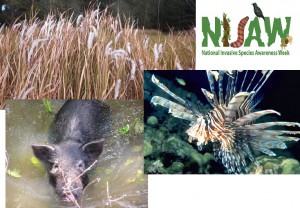 Invasive species are non-native or exotic species that do not naturally occur in an area, cause economic or environmental harm, or negatively impact human health. These invasive species have become the number one threat to biodiversity on protected lands. However, invasive species do not know boundaries, and as a result, public, private lands, natural and man-made water bodies, and associated watersheds are affected. National Invasive Species Awareness Week (NISAW) is February 21-27, 2016.
Invasive species are non-native or exotic species that do not naturally occur in an area, cause economic or environmental harm, or negatively impact human health. These invasive species have become the number one threat to biodiversity on protected lands. However, invasive species do not know boundaries, and as a result, public, private lands, natural and man-made water bodies, and associated watersheds are affected. National Invasive Species Awareness Week (NISAW) is February 21-27, 2016.
It is estimated that Florida Agriculture loses $179 million annually from invasive pests (http://www.defenders.org/sites/default/files/publications/florida.pdf). Generally, eradication of an invasive species is difficult and expensive. Most of the mitigation efforts focus on control rather than eradication.
EDDMaps (Early Detection and Distribution Mapping System), a web-based mapping system for reporting invasive species, currently has 667 different invasive plants reported in Florida. Many invasive insects, animals and diseases have also landed in Florida. Some famous invasive species in Florida include cogongrass, wild hogs, red imported fire ants, Chinese tallow, and lionfish.
For National Invasive Species Awareness Week, the University of Florida IFAS Northwest Extension District will highlight two invasive species each day. There are a couple of ways to receive this information each day of NISAW:
- Go to http://subscribe.ifas.ufl.edu and sign up for the Panhandle Outdoors Newsletter, or
- Go to https://www.facebook.com/IFASNW/ and “Like” us on Facebook.
You can help us control invasive species in several ways. First, always be cautious when bringing plants or plant materials into the state. Plants or even dead plant material can harbor weeds, insects and diseases that can become invasive in our state. Second, when you see something suspicious, contact your local extension agent for help identifying the weed, insect or disease. Third, you can volunteer your time and effort. Invasive species control is difficult and requires a cooperative effort for funding and manpower. The state has several Cooperative Invasive Species Management Areas (CISMA) in which public and private organizations work together to control invasive species in their area. These CISMAs hold work days in which volunteers can help remove invasive species from the environment.
For more information about NISAW or invasive species, contact your local county extension agent.
- Killer Turkey Food Plot - January 31, 2025
- Common Wildlife Food Plot Mistakes - November 8, 2024
- Seasonality of Prescribed Burning Workshop - February 23, 2024
